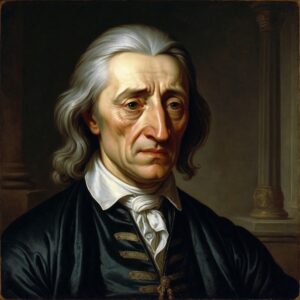In the tumultuous landscape of the 17th century, a new voice emerged that would challenge the very foundations of governance. John Locke, a philosopher and revolutionary thinker, argued that government exists to serve the people, not the other way around. His profound ideas on natural rights—life, liberty, and property—along with his concept of a social contract, redefined the relationship between rulers and the ruled.

“New opinions are always suspected, and usually opposed, without any other reason but because they are not already common.”
-John Locke
The Perspective Shift: The Power of the People
Locke’s philosophy was revolutionary. He contended that rulers derive their authority from the consent of the governed. This radical notion was not just theoretical; it was a call to action for individuals to demand their rights and hold their leaders accountable. In Locke’s view, if a government fails to protect the rights of its citizens, the people not only have the right but the duty to overthrow it. This perspective marked a significant shift in the political landscape, empowering individuals to question authority and advocate for justice.
His ideas did not go unnoticed. They became a beacon of hope during pivotal moments in history, including the American Revolution and the drafting of the U.S. Constitution. The French Revolution also drew inspiration from Locke’s principles, leading to a wave of change that altered the course of nations.
John Locke: The Man Behind the Ideas
John Locke was born on August 29, 1632, in Wrington, England. Growing up during a time of political upheaval, Locke’s early life was marked by the English Civil War, which shaped his understanding of authority and governance. He attended the prestigious Westminster School and later studied at Christ Church, Oxford, where he immersed himself in philosophy and science.
Locke’s early influences came from the Enlightenment thinkers around him, such as René Descartes and Thomas Hobbes. However, unlike Hobbes, who believed in a strong authoritarian government, Locke championed the idea that government should be a reflection of the people’s will. His groundbreaking ideas began to take shape during his years at Oxford, where he engaged in discussions about politics, ethics, and the nature of human existence.
In 1667, Locke met Anthony Ashley Cooper, the future Earl of Shaftesbury, who became a significant patron and ally. Their friendship provided Locke with the opportunity to engage in political discussions and explore his ideas in greater depth. During this period, Locke wrote some of his most important works, including “Two Treatises of Government,” published in 1689, which laid out his theories on natural rights and the social contract.
The Power of Education and Advocacy
Locke believed that knowledge was key to empowerment. He advocated for education as a means to enlighten individuals and promote critical thinking. He emphasized the importance of a well-rounded education that fostered reason and understanding. His thoughts on education were encapsulated in his work, “Some Thoughts Concerning Education,” where he outlined methods for teaching children to think independently and morally.
Locke’s ideas gained traction, especially as Europe faced political revolutions and struggles for democracy. His writings influenced key figures in both the American and French Revolutions. Thomas Jefferson, in particular, drew heavily on Locke’s concepts of natural rights when drafting the Declaration of Independence, asserting that governments are instituted to secure these rights.
Landmarks in Locke’s Life
- 1632: Born in Wrington, England.
- 1652-1656: Attended Westminster School and Christ Church, Oxford.
- 1667: Began a significant friendship with Anthony Ashley Cooper, which shaped his political thought.
- 1689: Published “Two Treatises of Government,” articulating his views on the social contract and natural rights.
- 1690: Released “An Essay Concerning Human Understanding,” which explored the nature of knowledge and human cognition.
- 1704: Died on October 28, in Oates, Essex, leaving behind a legacy that would shape modern political philosophy.
Locke’s life and work remind us that the pursuit of knowledge and the courage to challenge prevailing norms can lead to profound societal change. His journey encourages us to continue questioning, educating, and advocating for a world where the rights of individuals are at the forefront of governance.
“All mankind… being all equal and independent, no one ought to harm another in his life, health, liberty, or possessions.”
-John Locke
Implications: A Blueprint for Governance and Freedom
The impact of John Locke’s work was profound and far-reaching. His advocacy for natural rights and government by consent laid the groundwork for modern democracy and the protection of individual freedoms. Locke’s legacy serves as a reminder that governance should be rooted in the will of the people, creating a system where citizens are empowered to shape their own destinies.
Today, as we reflect on Locke’s contributions, we must ask ourselves: How do we ensure that our governments remain accountable to us? What steps can we take to uphold our rights and advocate for a society that values liberty and justice for all?
At Perspectives Forge, we believe that the fight for individual rights and good governance is ongoing. Just as Locke challenged the norms of his time, we, too, must question the systems in place today. Are our voices being heard? Are our rights being protected? These questions are vital as we navigate the complexities of our modern world.
Your Call to Action: Championing the Social Contract
Let John Locke’s legacy inspire you to engage actively in your community and demand the change you wish to see. Reflect on your rights and responsibilities as a citizen. How can you contribute to a society that honors the principles of equality and justice?
Locke’s vision of a government accountable to the people remains a powerful blueprint for our future. Together, let’s continue forging new perspectives, ensuring that our voices resonate in the halls of power and beyond.
